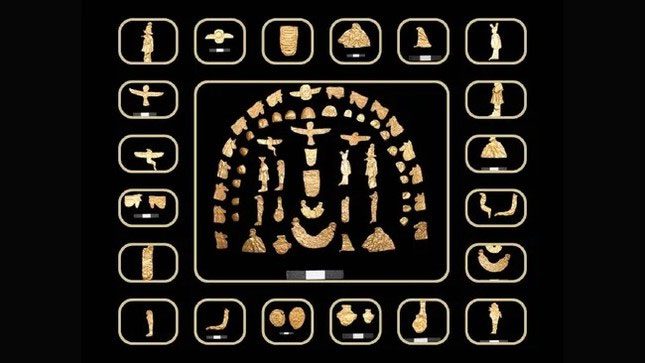Archaeologists in Egypt have discovered an ancient tomb containing over 60 individuals along with bronze coins and small gold statues, according to the Egyptian Ministry of Tourism and Antiquities.
The research team uncovered the graves in Damietta, located on the northern Mediterranean coast. Some of the tombs date back to the 26th Dynasty (688 to 525 BC), while others appear to be from the Ptolemaic period (304 to 30 BC). These findings include pottery and shabti figurines, which were believed to serve the deceased in the afterlife.

Gold leaf statues from ancient Egypt found in dozens of tombs in Damietta. (Photo: Egyptian Ministry of Tourism and Antiquities).
The researchers focused on 38 bronze coins discovered in a ceramic jar at the site. These coins date back to the Ptolemaic period, during which the descendants of one of Alexander the Great ruled Egypt.
Thomas Faucher, director of the Alexandria Research Center in Egypt, noted that from the released images, many of the coins appear to feature the head of Zeus Ammon. This deity is a combination of the Greek god Zeus and the Egyptian god Ammon (also spelled Amun), who is associated with prophets and prophecies.
At least one of the coins in the images seems to depict an eagle with a ram’s horn illustrated to the left of the bird. Based on these details, Faucher dated these coins to the late third century BC.
In addition to the coins, the gold statuettes buried with the deceased are also noteworthy. From the images released, it seems that some of the figurines depict “Ba birds”—mythical creatures in Egyptian mythology that have wings and human heads. In ancient Egyptian belief, “Ba” represents a part of the soul and is sometimes depicted as a bird that can gather food to nourish the dead, according to the Egypt Center at Swansea University.
Besides the Ba birds, some gold leaf statuettes appear to depict the “Eye of Horus,” a falcon-headed god. Artifacts representing the Eye of Horus were very popular in ancient Egypt and were believed to possess protective powers.


















































